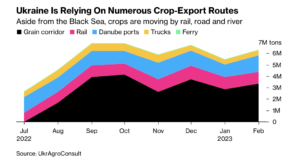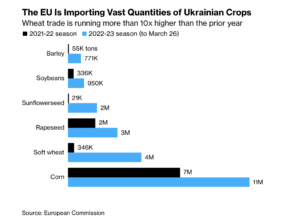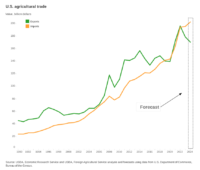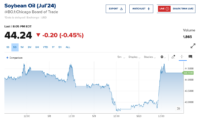Bloomberg's Clarice Couto reported this past Friday that "a surprising tax change in agriculture powerhouse Brazil has the potential to make soy grown in the world’s largest bean exporter less…
Concerns Over Black Sea Grain Initiative Persist, as Poland, Hungary Block Ukrainian Ag Imports
Reuters writer Michelle Nichols reported late last week that, “U.N. Secretary-General Antonio Guterres has written to Russia, Ukraine and Turkey to raise concerns about the implementation of a deal that allows the safe wartime export of grain from several Ukrainian Black Sea ports, a U.N. spokesman said on Friday.
“The United Nations has said no ships were inspected on Tuesday under the deal – agreed in July last year – ‘as the parties needed more time to reach an agreement on operational priorities.’ Inspections resumed on Wednesday.
“‘The Secretary-General has written letters to the parties and we are diligently working in close collaboration with Turkey to maintain the continuation of the vital agreement,’ U.N. spokesman Stephane Dujarric told reporters.”
Nichols added that, “Russia’s Foreign Ministry said on Thursday that ‘there is no need to talk about the further extension of the Black Sea initiative after May 18’ unless there was progress on solving what it called ‘systemic problems‘ with its own food and fertilizer exports.”

A separate Reuters article last week reported that, “The West still has time to remove ‘obstacles’ hindering the implementation of the Black Sea grain deal before a deadline on May 18, senior Russian diplomat Mikhail Ulyanov said on Friday.
“The Black Sea grain export deal was renewed for 60 days last month, but Russia has signalled it may not agree to extend it further unless the West removes obstacles to the export of Russian grain and fertiliser.”
“Western powers imposed tough sanctions on Russia over its Feb. 24, 2022, invasion of Ukraine. Its food and fertiliser exports are not sanctioned, but Moscow says restrictions on payments, logistics and insurance are a barrier to shipments,” the article said.
Dow Jones writer Kirk Maltais reported on Friday that, “Concerns about Russia’s stance on renewing the Black Sea export deal along with drought-stricken winter wheat in the U.S. helped spark a bounce in prices, with traders evaluating wheat futures as oversold, said Joel Karlin, president of Ocean State Research.”
#wheat🌾, year-to-date pic.twitter.com/sCMRFTbFtf
— FarmPolicy (@FarmPolicy) April 15, 2023
Also last week, Reuters writers Nigel Hunt and Jonathan Saul reported that, “Under the pact to create a safe shipping channel, Ukraine has been able to export some 27.7 million tonnes of agricultural products, including 13.9 million tonnes of corn and 7.5 million tonnes of wheat.
“This represents about 60% of Ukraine’s corn exports in the current 2022/23 season and 56% of wheat exports.”
The real value of BSGI is shown by world food indexes. A well-functioning Grain Corridor stabilizes prices, making food more affordable. Thanks for support @PowerUSAID! https://t.co/Y2bBf1729U
— Oleksandr Kubrakov (@OlKubrakov) April 15, 2023
Hunt and Saul pointed out that, “Ukraine’s ports had been blocked before the agreement was reached in July last year and it is unclear whether it would be possible to ship grain if Russia withdrew.
“Insurance rates, which are already high, would be likely to climb and shipowners could prove reluctant to allow their vessels to enter a war zone without Russia’s agreement.”
Elsewhere, Bloomberg writer Veronika Gulyas reported on Saturday that,
Hungary joined Poland in announcing a halt in Ukrainian agricultural imports, saying that duty-free imports from its neighbor in the face of Russia’s invasion are putting Hungarian farmers at risk.
“The suspension will be in effect until June 30 ‘in the absence of substantive EU measures,’ the Agriculture Ministry in Budapest said in a statement. Poland halted imports of grain and some other food products from Ukraine to avert a ‘crisis of agriculture,’ Jaroslaw Kaczynski, leader of the governing Law and Justice party, said earlier Saturday.
“Poland and other neighbors of Ukraine had agreed to help get grain out of Ukraine and on to global markets after the Russian invasion blocked exports last year. That stance has been shifting as part of the supply is piling up in eastern Europe, triggering protests by Polish farmers this month.”

“Ukraine’s Agriculture Ministry said the Polish decision violates an agreement reached last week in response to the protests, which stipulates that wheat, corn, sunflower seed and rapeseed from Ukraine can be shipped to Poland as long as it is then sent on to other countries by July.”
And Reuters writer Pawel Florkiewicz reported on Saturday that, “After Russia’s invasion blocked some Black Sea ports, large quantities of Ukrainian grain, which is cheaper than that produced in the European Union, ended up staying in Central European states due to logistical bottlenecks, hitting prices and sales for local farmers.”







